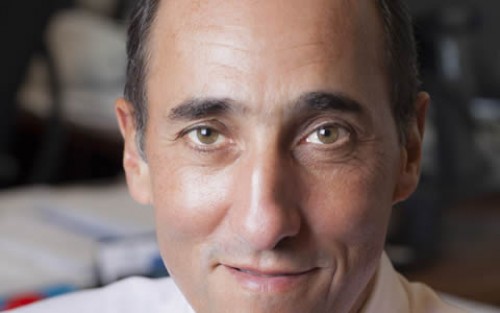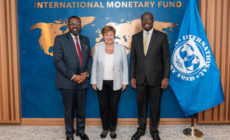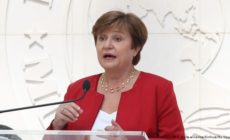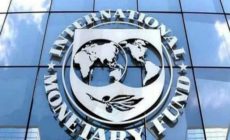IMF doubts Ghana’s targets
- Posted on
- Comment
 The International Monetary Fund (IMF) has cast serious doubts onGhana’s economic projections as it estimates overall real Gross Domestic Product (GDP) growth at4.5% for 2014, far below government’s target of 7.1%.
The International Monetary Fund (IMF) has cast serious doubts onGhana’s economic projections as it estimates overall real Gross Domestic Product (GDP) growth at4.5% for 2014, far below government’s target of 7.1%.
The 4.5% GDP growth projectionsrepresents 0.3% points decrease below the previous 4.8%, the IMF estimated in February this year.
The Fund noted that Ghana continues to face significant domestic and external vulnerabilities on the back of a large fiscal deficit, a slowdown in economic growth and rising inflation.
An IMF mission led by Mr Joël Toujas-Bernaté has completed the first round of discussions on a possible programme of economic reforms that could be supported by the Fund and made their findings in an end-of-mission statement posted on its website.
The latest IMF projection is cause for concern because in July Mr Seth Terkper, Minister of Finance, revised macroeconomic targets for 2014 downwards with the explanation that domestic and global difficulties had impacted adversely on the economy.
In line with the challenges, the overall real GDP, including oil, growth target was lowered from 8% to 7.1% while the non-oil real GDP growth target went down from 7.4% to 6.6%.
At the time, the Finance Minister cited the energy shortfalls challenge, mounting inflation and rising interest rates coupled with exchange rate depreciation, which he said posed a strong downside risk to the achievement of the growth target.
He also cited the challenge involving decline in gold prices, challenges in the implementation of some of the revenue measures and slowdown in economic activity occasioned by the energy crisis.
The IMF mission also projectedinflation to reach an average of around 15% for the year, saying the fiscal deficit would remain high at around 9.75% of GDP, driven by weak revenue performance, a large wage bill and substantially rising cost of debt service.
Mr Toujas-Bernaté said the external current account deficit is projected to narrow to 10% of GDP, as imports declined substantially due to slower growth and a large depreciation of the currency while export performance remained weak.
The currency weakened sharply through August, before recovering very recently. In September, the issuance of a $1 billion Eurobond and the Cocoa Board (Cocobod) successfully raising $1.7 billion for the financing of a projected excellent cocoa crop were positive developments. Nonetheless, gross international reserves will remain at a low level.
“The mission had constructive and candid discussions with the authorities who showed an appreciation of the risks associated with these imbalances and vulnerabilities. The authorities identified earlier this year a set of measures designed to put the country back on track while preserving growth momentum,” he said.
Mr Toujas-Bernaté said while important, these measures have not managed to turn the financial situation around as a result of some implementation delays, which have set back the objectives of putting public debt on a more sustainable path and reducing inflation.
The authorities expressed their intent to prepare and implement additional upfront measures, building on ongoing broad consultations.
The statement said a more ambitious and front loaded fiscal consolidation is needed to help place public debt on a sustainable path and to allow monetary policy to be more effective in bringing down inflation, by strictly limiting budget deficit financing by the Bank of Ghana.
It said front loaded adjustment should be realised through reductions in Ghana’s comparatively high public sector wage costs, the elimination of costly and untargeted subsidies for energy and petroleum products, and a better prioritisation of capital spending.
On the revenue side, the statement suggested that the need for the reduction of tax exemptions and strengthening revenue administration through a better targeting of large taxpayers appear necessary.
The statement said it would be important for the country to expand well-targeted social protection programmes to mitigate the potential impact of fiscal consolidation measures on the most vulnerable groups of the population.
In the medium term, structural reforms and institutional changes would be key to sustainable fiscal consolidation and lasting expenditure discipline.
Discussions on a possible programme that could be supported by the IMF would continue in Washington during the joint IMF/World Bank Annual Meetings scheduled for October.
The mission met with President John Dramani Mahama; Vice President Kwesi Amissah-Arthur; Dr Kwesi Botchway, Chairman of National Development Planning Commission; Finance Minister Seth Terkper; Minister of Gender, Children and Social Protection, Nana Oye Lithur; Bank of Ghana Governor, Dr Kofi Wampah; other senior officials, and representatives of the private sector, the donor community and civil society.
Government revises key macroeconomic targets
Finance Minister Terkper raised end-of-year inflation target of 9.5% to 13.0 (+2 or-2%) with the overall budget deficit target up to 8.8% of GDP from 8.5%.
Gross International Reserves are pegged at not less than three months of import cover of goods and services.
The total non-oil tax revenue have been revised downwards by GH¢948.0 million to GH¢18,712.3 million, equivalent to 16.3% of GDP.
He added that the revised non-oil tax revenue for the year represents an increase of 38.1% over the out turn for 2013.
The oil revenue has also been revised upwards by GH¢707.1 million to GH¢2,416.5 million and grants have been revised upwards from GH¢1,130.7 million to GH¢1,390.8 million.
Revenue and grants for the fiscal year have been revised upwards from GH¢26,056.5 million to GH¢26,230.3 million, equivalent to 22.9% of GDP.
The revised revenue and grants for the year represents an increase of 34.7% over the outturn for 2013.
The Minister also told legislators that the estimate for total expenditure and arrears clearance have gone up by GH¢1,331.1 million from GH¢35,027.3 million to GH¢36,358.3 million (31.7% of GDP), mainly on account of higher wages and salaries, interest payments, foreign-financed capital expenditures and subsidies.
He said estimates for payment of wages and salaries have been raised from GH¢8,967.8 million to GH¢9,218.9 million due the Cost of Living Allowance [COLA] approved for public sector employees.
Mr Terkper also informed Parliament that interest payment projections have increased from GH¢6,178.6 million to GH¢7,884.7 million while foreign-financed capital expenditure projections have pushed up from GH¢4,525.8 million to GH¢4,748.7 million.
Provision made for subsidies in the 2014 budget have been jumped from GH¢50 million to GH¢618.8 million.
Estimates for VAT revenue and total tax revenue, transfers to the National Health Insurance Fund, the Ghana Education Trust Fund and the District Assemblies’ Common Fund are estimated to be lower than earlier projected.
But projections for transfers to GNPC from the oil revenue have been surged from GH¢423.7 million to GH¢599.0 million.
However, interest payments and subsidies, estimated spending on goods and services have been slashed from GH¢1,550.0 million to GH¢1,085.0 million and domestic financed capital expenditure have been revised downwards from GH¢1,491.5 million to GH¢1,241.5 million.
According to him, given the revised revenues and expenditures estimates, the revised 2014 budget will result in an overall budget deficit of GH¢10,128.1 million, equivalent to 8.8% of GDP, against the earlier estimate of GH¢8,970.8 million, equivalent to 8.5% of GDP.
Mr Terkper said the new budget deficit will be financed from domestic and foreign sources supported by the excess amount accrued to the stabilisation fund for debt repayment, adding that foreign financing of the deficit is projected at GH¢5,936.3 million whilst domestic financing of the budget is estimated at GH¢3,856.4 million.
An amount of GH¢385 million from the Stabilisation Fund would also be used to repay debt.
The aim of the Supplementary Estimate was to seek parliamentary approval to commit additional resources to fund additional expenditures resulting from the revisions made to the 2014 budget.
He said: “We are requesting approval for a total amount of GH¢3,196,855,671 as Supplementary Expenditures.”
The request has since been approved by Parliament.
-The Finder










 (Selorm) |
(Selorm) |  (Nana Kwesi)
(Nana Kwesi)